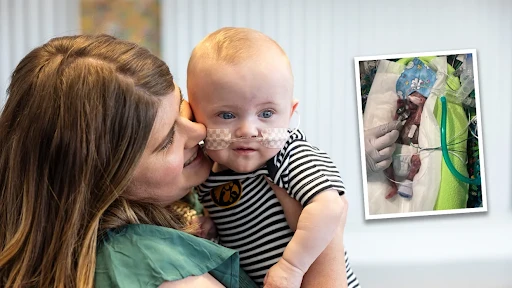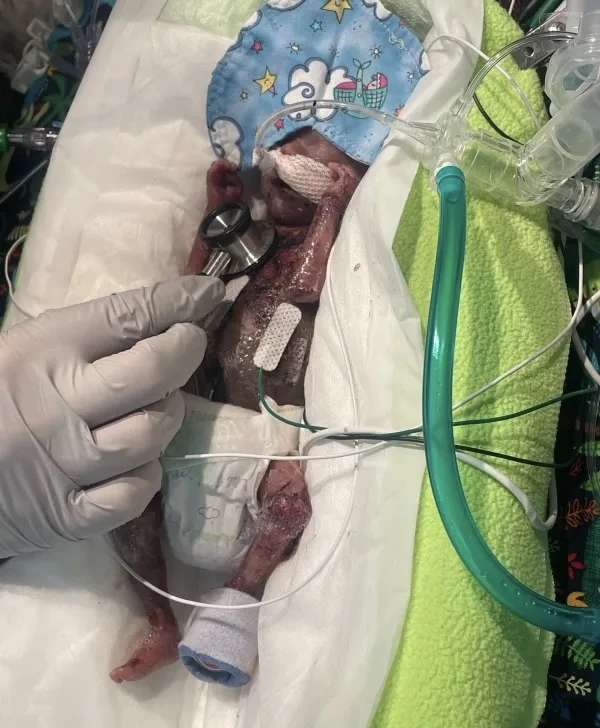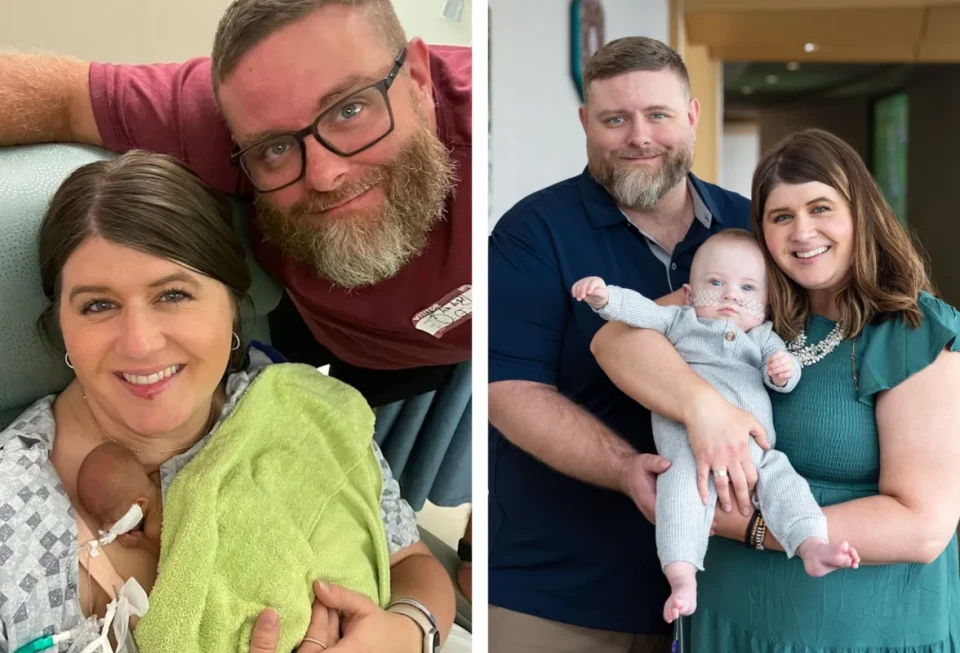
CNA Staff, Jul 28, 2025 / 16:33 pm (CNA).
The world’s youngest premature baby, who was born more than four months early, celebrated his first birthday this month.
Nash Keen’s first birthday was much like any other baby’s — cake with extra whipped cream, a gathering of family and friends, and stacks of gifts — except that his birthday made him the holder of the Guinness World Record for the most premature baby to survive.

Nash was born at 21 weeks’ gestation, 133 days early. At only about 10 ounces, he weighed less than grapefruit and was a little over eight inches long. He was so lightweight that when his mother, Mollie Keen, held him, she could barely feel his weight.
The impossibly small baby was born July 5, 2024, at the University of Iowa Health Care Stead Family Children’s Hospital — one of the most advanced in the nation for neonatal care.
There was effectively no chance of survival for Nash as no one born this young had survived.
‘I never lost hope’
His parents, Mollie and Randall Keen, were terrified when they discovered that due to a condition Mollie had, Nash would be born early.
At a 20-week scan for the baby, the doctor found that Mollie was already two centimeters dilated. Mollie had felt that something was wrong and had asked for the closer examination.
The couple had already lost a baby. Their first baby, a girl named McKinley, was born at 18 weeks’ gestation about two years before Nash’s birth.
They were terrified they would lose another child.
“We were devastated. We thought we were going through the exact same thing, and we thought we were going to lose this baby,” Mollie said in the hospital press release.
Mollie had been diagnosed with cervical incompetence, a condition where the cervix begins to open too early, often leading to premature birth or miscarriage. To further complicate things, she has polycystic ovary syndrome (PCOS) — a relatively common condition that can make it difficult to conceive a child due to inconsistent ovulation.
“At that point, I didn’t know what I could do to turn things around,” Mollie said.

In spite of the odds, the couple pursued all the treatment they could find for their unborn baby.
“I never lost hope for Nash,” Mollie said.
That same evening, after her 20-week scan, Mollie had already begun to feel mild cramping. The couple rushed to the emergency room, where Mollie was told to go on bed rest and try to delay labor.
If the baby could hold out to the 21-week mark, the hospital would have the resources to treat him.
While different NICUs (neonatal intensive care units) have different levels of care they are able to offer premature babies, the University of Iowa NICU has recently begun offering lifesaving care for babies born at 21 weeks’ gestation. According to the hospital, its own NICU was one of only a “few places in the world equipped to potentially save Nash.”
In the early hours of the morning, Mollie and Randall rushed to Iowa City. Mollie’s water broke, increasing the chances of complications, and the hospital tried to delay labor. After two days — just hours after the 21-week mark — Mollie’s delivery began. Less than 10 hours later, Nash was born.
The first hours and days after delivery have the highest jeopardy, according to Dr. Amy Stanford, the neonatologist who supervised Nash’s resuscitation. Extremely premature babies need care around the clock.
The baby’s size can determine if he or she will live or die. If the baby is too small, even the smallest tubes won’t be able to fit.
“Sometimes babies born at 21 weeks are just too small for even our tiniest breathing tubes and intravenous lines,” Stanford said.
But Nash was lucky — he was just big enough for the tubes. After Stanford placed the breathing tube, his condition began to stabilize.

During the 189 days that Nash was in the hospital, a team of more than 30 staff members cared for him. Doctors watched Nash closely, using hemodynamics, an ultrasound-based technique to check on the baby’s blood flow and heart function.
“Around the one-month mark, we all began to breathe a little easier,” Stanford said. “While we knew Nash still had a long journey ahead, that was the point when we started to feel more confident that he had a real chance of going home.”
But Nash still had more challenges. His vital signs dropped for several nights because of his immature lungs and heart, and he underwent a surgery for a perforated bowel that had a 30%-40% mortality rate.
“He can be doing well for several days and then have one to two bad days in between, but I’m starting to understand that’s part of the journey that most NICU parents go through and that we’re not alone,” Mollie wrote online during Nash’s NICU stay, according to the hospital press release.
After 189 days in the hospital, at the beginning of 2025, Nash went home.

Going home: A ‘victory’
In Ankeny, Iowa, the Keen family celebrated Nash’s first birthday with a small gathering of family and close friends, who showered the birthday boy with presents — 70 new outfits as well as plenty of toys and diapers.
The doctors gave the 1-year-old a special dispensation — he could have birthday cake for the special occasion.
The couple has nicknamed their son “Nash Potato” and they describe him as “determined, curious, and the happiest baby you’ll meet,” according to the Guinness World Records press release.
Mollie described the last year as “surreal.”
“A year ago, we weren’t sure what the future would look like, and now we’ve celebrated his first birthday,” she said. “It’s emotional in so many ways: pride, gratitude, even some grief for how different his journey has been. But above all, it feels like a victory.”
Nash still has ongoing health issues, including a minor heart defect, but his doctors say the defect should resolve as he gets older. While he has been delayed in reaching typical baby milestones, Nash didn’t experience any brain bleeds while in the NICU, so doctors hope his cognitive function won’t be affected.
Mollie said she hopes Nash will “see his story as a source of strength.”
“I just hope that Nash realizes just how loved he is and how many people have cheered him on from the very beginning,” she said. “I want him to grow up and be healthy, happy, and confident in who he is.”
If you value the news and views Catholic World Report provides, please consider donating to support our efforts. Your contribution will help us continue to make CWR available to all readers worldwide for free, without a subscription. Thank you for your generosity!
Click here for more information on donating to CWR. Click here to sign up for our newsletter.









